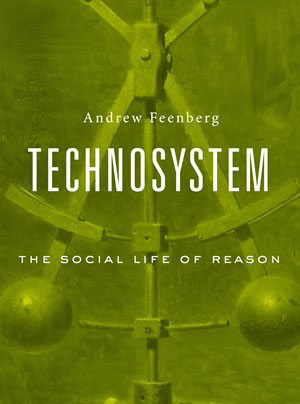
Technosystem: The Social Life of Reason is a philosophical reflection on the technified world in which we live. Ours is a world of technical systems designed in accordance with technical disciplines and operated by personnel trained in those disciplines. This is a unique form of social organization that largely determines our way of life. Technosystem builds a theory of both the threats of technocratic modernity and the potential for democratic change.
Technosystem draws on the tradition of social criticism represented by Herbert Marcuse and the Frankfurt School. These radical thinkers recognized the dystopian implications of the generalization of instrumental rationality but they did not advance a convincing alternative to the new forms of domination imposed by rational systems. That is the contribution of the empirically informed approaches of Science, Technology, and Society Studies (STS). Technosystem uses these approaches to reconcile the new power of rationality with the agency of a public increasingly mobilized to intervene in technical life. In STS this is called “co-production.” The application of this concept in Technosystem recognizes emerging forms of resistance, such as protests and hacking, as essential expressions of public life in the “rational society.”
Combining the most salient insights from critical theory with the empirical findings of STS, Technosystem advances the philosophical debate over the nature and practice of reason in modern society. The book offers lucid explanations of the theories of leading figures in both traditions. Neither tradition is sufficient by itself but together they offer deep insight into contemporary experience in technologically advanced societies.
Technosystem should be read as a attempt to link up several different traditions of social thought in an innovative theory of modernity. The big question to which Technosystem is addressed is the difference between modern society and all earlier forms of society. The answer is the place of rationality in social life. Reason is a mental faculty, equally present in the human mind throughout all of history and indeed of pre-history. But only in modern society are the major social institutions organized as rational systems. Where custom and tradition used to guide most social decisions, today we look up the answers to our questions in user’s manuals and the texts of the various technical disciplines that preside over our lives.
At the beginning of the 20th century, philosophers and sociologists attempted to understand the difference between reasoned grounds for belief and rational procedures of social organization. A scientific theory is rational in the first sense if it is based on good evidence and sound reasoning. In that case we have reason to believe it. A bureaucratic system is rational in the second sense if it follows its own well formulated rules. As good citizens or employees we are expected to obey it even if those rules are not based on a scientific understanding of the world.
There is more: social rationality masks many non-rational influences on social decisions. For example, unlike bureaucracy, technology must be based on valid knowledge. That knowledge satisfies the first definition of rationality. It is usually codified in a technical discipline such as engineering. But since there are many ways to apply the technical disciplines in any particular case, there are always design decisions that depend on other sources such as economic, political, aesthetic, or traditional notions. Ordinary individuals weigh on the decisions through various means such as markets, regulation, hacking and social protest. The resulting technologies appear perfectly rational even though many other motives have played a role in their design.
In the end we get technologies that embody values as well as knowledge but this is a hidden, unconscious aspect of the technical environment. Similarly, bureaucracies and markets justify themselves as rational even though they embody many social forces that have no basis in knowledge. The veil of rationality covers these other influences and makes social criticism difficult. Rationality has become the dominant ideology. Technosystem is therefore an argument for a new kind of ideology critique adapted to the rational society.
Technosystem begins with a lecture that sums up much of the argument in non-technical language. I use two illustrations to make my points. A reader browsing the book would be amused by pages 9-12 where I develop the argument around an Escher print and a cartoon from The New Yorker. That would be a good starting point.
Escher’s Drawing Hands shows two hands drawing each other. The circularity of the image is paradoxical. This illustrates the way in which social groups in modern societies are formed around technical artifacts and systems which their members modify as they work within them. We both shape and are shaped by the technologies, the markets and the bureaucracies that organize our social life. This is co-production.
But Escher’s print is the product of an artist who stands outside the paradox he depicts. No one draws Escher as he draws Drawing Hands. Is there an equivalent external position in the rational society? Many think there is. The scientist, the engineer, the economist, the management theorist, all appear to stand outside the system governed by the laws they discover. This is the illusion of technology, the false belief that there is an external place to stand from which to know and organize society. But society is not a technical project. This is illustrated by the cartoon which I leave to future browsers to discover.
Our first child was born in the early 1970s during an upsurge in feminist demands for more humane obstetric procedures. The admission of partners to labor and delivery rooms was the most important reform resulting from this agitation. We were among the first lucky ones to enjoy this new dispensation. This is where I discovered the theme of this book. The astonishing experience of admission to the process of birth, in violation of long-standing medical tradition, got me thinking about how arbitrary are many of the rules and regulations we take for rational.
This was not the only time I was reminded of the social influences on what are ostensibly purely rational procedures. I worked with a medical research foundation and a research institute that created the first online education program. These experiences confirmed my belief that the “rational society” is no technocratic utopia, but the scene on which social forces confront each other. There are many opportunities today in this period of political turmoil over environmentalism to measure the limits of rationality as a social form.
Technosystem provides a theoretical framework for an insight that comes to us in fragments from time to time. It aims to defend citizen agency against the frequent unjustified ideological appeals to rationality that characterize our political life. This is ultimately what I hope Technosystem can communicate to its readers.


Andrew Feenberg teaches in the School of Communication, Simon Fraser University, where he directs the Applied Communication and Technology Lab. He also serves as Directeur de Programme at the Collège International de Philosophie in Paris. His books include Questioning Technology, Transforming Technology, Heidegger and Marcuse, Between Reason and Experience, and The Philosophy of Praxis. His most recent book is Technosystem: The Social Life of Reason, published by Harvard in 2017, and featured in his Rorotoko interview. A book on Feenberg’s philosophy of technology entitled Critical Theory and the Thought of Andrew Feenberg, edited by D. Arnold and P. Michel, has also appeared in 2017.